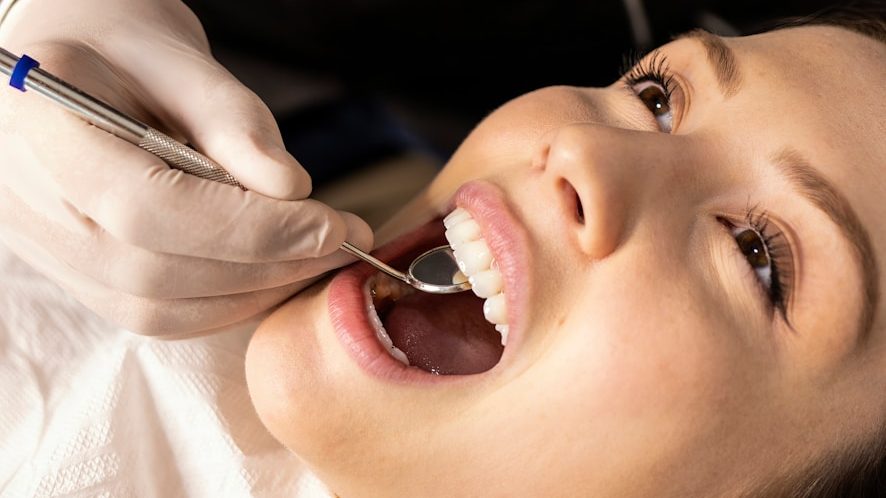Oral health problems can cause a significant burden on a person’s health, relationships, and overall well-being. Despite this, many people minimize the importance of oral and dental health. This article discusses oral health, general symptoms of dental issues, and common dental problems. It also examines how to prevent dental problems, how to maintain good oral health, and when to see a dentist. The most common oral health issues are listed as follows:
- Toothache refers to pain in and around the teeth and jaws that’s usually caused by tooth decay. It is treated by pain killers and finding the cause followed by specific procedures.
- Stained teeth occur when stain particles, such as pigmented residue from food or drink, build-up in the film of protein that covers the tooth enamel. It is treated by scaling and polishing, Microabrasion, and bleaching.
- Cavities are permanently damaged areas in the hard surface of your teeth that develop into tiny openings or holes. It is treated by removal of carries followed by filling or ROOT canal treatment.
- Chipped tooth is when a piece of tooth enamel comes off of a tooth. It’s the no. 1 type of dental injury and aesthetic issue. Treatment based on severity. It is treated by dental bondings, filling, crowns, veneers.
- An impacted tooth remains stuck in gum tissue or bone for various reasons. If your impacted tooth isn’t causing any symptoms, your dentist may suggest a wait-and-see approach. And if it causes other serious oral health issues, extraction is recommended.
- A fractured tooth, often called a cracked tooth, is when a crack appears in your tooth. It is treated by RCT and dental crowns.
- Tooth sensitivity triggered by heat or cold tends to occur when a tooth’s outer protective layer, the enamel, has worn down. It is treated by desensitizing toothpastes, removal of causes and good oral hygiene maintenance.
- Crooked Teeth may refer to: Malocclusion, a misalignment or incorrect relation between teeth. It is best treated by Ortho treatments like braces, veneers and dental crowns.
- Diastema is a gap or space between any two teeth, but it is particularly common between the upper front teeth. It is treated by veneers and braces.
- Gum disease, your gums may bleed when you brush your teeth and you may have bad breath. This early stage of gum disease is known as gingivitis. If gingivitis isn’t treated, a condition called periodontitis. It is treated by scaling and root planing. It depends upon the stage of the disease.
- Grinding of teeth is called bruxism. Stress and anxiety, the most common cause of clenching your teeth. It is treated by lifestyle modifications, muscle relaxants and night guards.
- Wisdom teeth can cause dental problems including overcrowding, impaction. Wisdom teeth often push into gum or another tooth and cause decay and infection, leading to pain, difficulty chewing and bad breath.
- Bad breath, or halitosis, can be embarrassing. Studies say that a dental condition is to blame for about 85% of people with persistent bad breath. The causes include gum disease, cavities, oral cancer, dry mouth, and bacteria on the tongue. It is treated by proper brushing, flossing, using mouthwashes, and maintaining a healthy diet.
- Oral cancer is a serious and deadly disease. Common risk factors are smoking, chewing betel nuts, and alcohol use.

Habits to avoid that wreck your teeth
- Chewing ice
- Playing sports with no mouth guards
- Bedtimes bottles in children
- Tongue piercing and jewelry
- Sticky candies and food
- Use of soda and cold drinks
- Opening stuff with your teeth
- Smoking and use of alcohol
- Chewing on pencils
- Biting nails
- Excessive use of mouthwash
- Too much hard brushing
Summary
Most common dental problems can be avoided if you:
- Brush your teeth twice a day
- Floss everyday
- See your dentist regularly
- Don’t smoke
- Get help for any problems you notice, such as mouth sores or rough spots
- Make appointments with your dentist when problems arise. Be sure to let them know about any pain or sensitivity you’re having and get urgent help for dental emergencies.
“Every tooth in a man’s head is more valuable than a diamond.”



